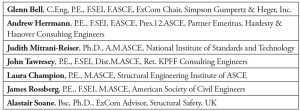Continuous improvement through sharing lessons from failures, near misses, and similar incidents is critical to any profession or industry. In the U.S. structural engineering community, we have long used publications, conferences, and university curricula for this purpose. However, we now have a new, robust tool for learning from failures through the recently launched system Confidential Reporting on Structural Safety in the US (CROSS-US).
The CROSS System
The CROSS system was established in the UK in 2005. Fashioned after the U.S. Aviation Safety Reporting System (ASRS) developed by NASA, CROSS is a system where “concerns, incidents, and near misses” of structural “failures” can be reported confidentially. These include pre-cursors of failures. When received and after depersonalization and de-identification, the reports are reviewed by a panel of distinguished industry experts first for quality and veracity, and then for analysis of lessons learned. CROSS publishes lessons learned in the form of anonymized reports, maintains a website and database of such lessons learned, and periodically publishes newsletters on trending issues.
The process maintains confidentiality throughout, including discarding identifying information once the analysis report of the case is prepared. The CROSS website and reports are open and free to all. In the fourteen years since establishment, CROSS has developed and refined its operating procedures to ensure the quality of its work, gained the trust of individuals reporting anonymously, and built a reputation as an invaluable resource based on the quality and integrity of its people. CROSS is a much-used resource that has positively impacted practice in the UK.
The Vision for CROSS International
We have much to learn from structural incidents and near misses internationally. Even a casual study of structural failures globally shows similar trends and challenges occur frequently. We repeatedly see mistakes that have led to failures in one country occur years later in another country. In an emerging vision for CROSS International, we will create several CROSS operations in various countries that share information on a common platform. In addition to CROSS in the UK and the United States, there are now CROSS entities in South Africa and Australia. Germany expects to launch later in 2019.
CROSS-US
CROSS-US is an entity of the Structural Engineering Institute of ASCE. It is led by an Executive Committee which reports to the SEI Board of Governors (Table). Established through funding provided by SEI, the long-term business plan as CROSS-US expands is to seek sponsorship from government agencies that have an interest in learning from structural failures.
The current CROSS-US Panel, which will evaluate submitted reports and publish CROSS products, is composed of prominent members of the engineering, academic, legal, regulatory, and standards-setting organizations in the U.S. We expect to expand this to about twenty through the addition of other disciplines as CROSS-US develops.
The CROSS-US website (www.cross-us.org) went live on July 1, 2019. Information is accessible at no charge. The database can be searched by keywords. You may sign up for email updates.
Reports may be submitted to CROSS-US through the link at the bottom of the home page. The website leads report submitters through a simple entry form. Reports need not be long or extensive. Supporting materials, such as photos and figures, may be appended. Once submitted, reports are received through the confidential website by one of the two Directors on the CROSS-US panel; the report is first depersonalized (meaning the name of the report submitter is removed) and then de-identified (meaning information regarding the identity of the project and parties involved with the project are removed). Then the depersonalized and de-identified reports are circulated to the CROSS-US Panel for review and comment based on their area of expertise.
Get Involved
Everyone should have an interest in improving practice through learning from failures and near misses. Visit www.cross-us.org periodically and study case reports and newsletters. Use the information in your organization. And, most important, please contribute reports confidentially. If you have questions or would like to get involved with CROSS-US, please contact one of the authors via email addresses.■

